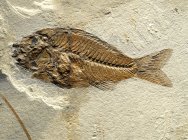Monte Bolca Fossil Quarry
Eocene Fossils of Monte Bolca, Italy |
Related
Interest: |
|
The fossils are collected by boring tunnels deep into the hillside formation, following the seam where the fossil fish layer goes into the mountain. The same family has owned this quarry for almost four hundred years. When the weathered matrix is split the fish open, but the rock ALWAYS shatters, such that all but the smallest Bolca fish are repaired. The larger fossils are normally reassembled from dozens of pieces. These fossils have been collected for centuries. During the crusades were considered (yep, THOSE crusades) to be remains of the last supper and are still considered to this day by many as evidence of the great flood. Kings of Europe collected them for their sheer beauty and rarity. Fossils discoveries include the moonfishes Mene rhombea and Mene oblonga, the batfish Eoplatax papilio, spadefish Exellia velifer, the fish Ceratoichthys, the crocodile Crocodilus vicetinus, and the snake Archaeophis bolcaensis.
|
||||||||||||
|
Fossil
Museum Navigation:
Home Geological Time Paleobiology Geological History Tree of Life Fossil Sites Fossils Evolution Fossil Record Museum Fossils |


